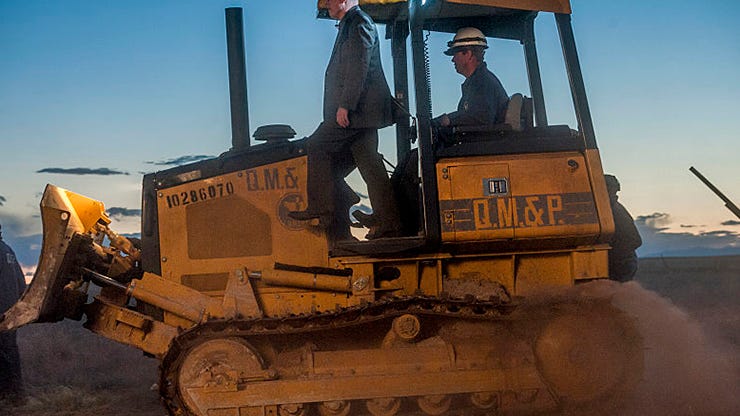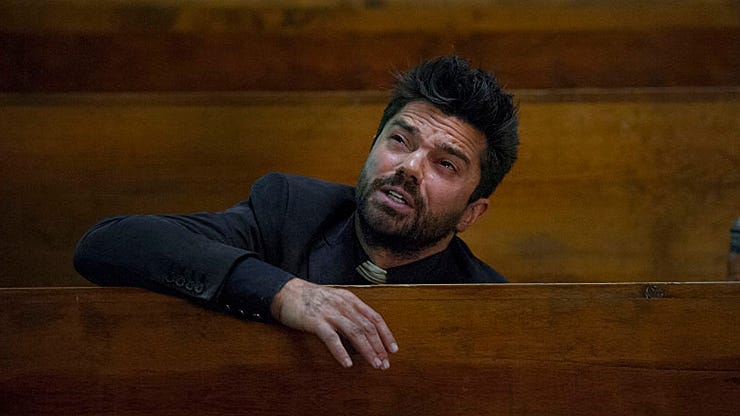Join or Sign In
Sign in to customize your TV listings
By joining TV Guide, you agree to our Terms of Use and acknowledge the data practices in our Privacy Policy.
Preacher: Quincannon and Jesse Have a Faith-Off
The God of Meat rises
In the world of Preacher, faith has proven to be a tricky concept. Most of the characters present a strongly held faith in one thing or another, and while Preacher isn't exactly mocking them, it has demonstrated that intense faith--of all types--can send people down some troubling paths. "El Valero" was another strong, occasionally fun episode of the show, but also one interested in how people respond to where blind-ish faith has taken them.
Big picture, everyone in Annville is where they are because of that faith. Eugene (Ian Colletti) and Emily (Lucy Griffiths), the show's most sympathetic characters on the surface, present traditional notions of faith in a Christian god and that hasn't exactly worked out for them. Still, faith doesn't just have to be in One True God; we put deep faith into people--bonds, relationships, and trust. Both Eugene and Emily perhaps naively projected their faith in God onto Jesse (Dominic Cooper), perhaps the world's worst preacher, friend, and confidant. Tulip (Ruth Negga) and Cassidy (Joseph Gilgun) aren't especially religious in a traditional sense, but they're frustratingly alone and a Hefty bag of blood and guts respectively due to a misguided trust in Jesse.
Which leaves Jesse and Quincannon (Jackie Earle Haley), the two pillars of "El Valero." We've already seen enough to understand Jesse's warped sense of faith--how it intermingled with his lingering guilt and self-hatred, and how the arrival of Genesis catalyzed all those feelings into a dangerous, egomaniacal savior complex cocktail. Jesse found himself alone in the empty church, clawing at the ground trying to bring Eugene back from hell, because he desperately wanted to believe that he was the chosen one. Otherwise, he was just a loser, a criminal, an extreme disappointment.
Prior to this episode, Quincannon's motivations and his distaste for religion had been less defined, but he seemingly and passionately hates it enough that Jesse's attempts to manipulate him didn't stick. Faith in religion being wack and God being an empty fraud is still a kind of faith, depending on how strongly you act on that belief. "El Valero" smartly filled in some of the blanks regarding Quincannon's past, and subsequently illustrated how significant life moments can alter how people approach their personal beliefs and internal perspective on faith.

Quincannon's origin story was so totally Preacher: While he, ever-committed to the meatpacking business, stayed home, his entire extended family took a ski trip to Vail, where they all tragically died. This event sent Odin over the proverbial edge, inspiring him to tear apart both a cow and his daughter to "prove" that they're essentially the same inside. No spirit. No soul. And therefore, he told Jesse's exasperated father, no God.
Maybe ripping out your child's large intestine to compare and contrast it with one of your steers isn't a sign of a sturdy mental health, sure. But sometimes tragedies are truly life-altering, and that's clearly been the case of Quincannon. His attitude toward Jesse and the church is even clearer now (though how he exactly broke the power of Jesse's persuasive abilities is still unclear).
For Quincannon, faith is a matter of fact, a truth. God isn't real at worst, or absolutely sucks at best. Every action beyond that is a straight line toward potential business success, which made Jesse's hemming and hawing on their verbal agreement that much more frustrating. And so, then came the bulldozers and the guns and the violence. Some people see massive, ornate churches as their cathedrals. Quincannon's is a huge food court. This POV is dark as heck, but it tracks.
Jesse, meanwhile, continued to be a mess. The steadfast belief that God picked him to be Genesis' host for a reason makes sense, but didn't exactly help Jesse become a better man of God. In "El Valero," Jesse had to come face his bad, self-aggrandizing decisions on two fronts: one with Quincannon's men literally beating down the doors of the church and another with Eugene "returning" to torment the confused preacher yet again.

The first front drove much of the episode's action, with Quincannon's goober foot soldiers blasting the church in orchestrated waves, only to scurry away once Genesis did its thing. Jesse didn't have much trouble on this front, swiping weapons, shooting off a dude's penis, and using holy water to make the most sacrilegious molotov cocktails in history. Jesse can sure handle his external problems with violence, that much has been proven.
But it was the second front--with those more internal issues--that Jesse struggled with yet again. Although Eugene made his sudden return from hell early in the episode, it was quickly apparent that it was all a figment of Jesse's alcohol-soaked, guilt-ridden, and sleep-deprived imagination.
Amid the bulldozers and the gunfire, Jesse had to wrestle with what he did to Eugene. And even after he admitted all wrongdoing to faux Eugene, the problem wasn't just solved. He tried to bargain with DeBlanc (Tom Brooke) and Fiore (Anatol Yusef), swapping Genesis for Eugene, but that plan went horribly wrong. Genesis left Jesse's body only to almost immediately return, scaring away its custodians, and leaving Jesse without an option to bring Eugene back.
Eventually, Jesse gave in to Quincannon. In a roundabout way, both had their faith rewarded. Quincannon, he of Church of Meat, got his land and presumably will get his food court. Screw God, then. Jesse, meanwhile, saw Genesis return to his body and perhaps therefore confirm that he is indeed a chosen one. The difference between them is that Quincannon already has his faith-changing moment years ago. Maybe losing Eugene is Jesse's moment. Maybe now he understands that it's not about manipulating people into choosing God, or alleviating his own guilt. He's on like his 10th second chance, but maybe it's time to finally rely on faith for good reasons, and to make good-ish choices.

Although already far different than its source material, Preacher certainly has a pointed, sometimes challenging look at faith and religion. But with episodes like "El Valero," the show continues to establish that, in this universe, faith isn't a "good/bad" or "either/or" proposition. Neither Quincannon or Jesse are Good Men, but that doesn't exactly matter. How they tussle with these big concepts, and how that influences their actions, is tremendously compelling.
This effort also displayed how adept Preacher is becoming at bouncing back and forth between playful, violent action sequences and weird, heady conversations. "El Valero" featured a main character return as an imaginary friend, multiple shootouts, extended conversations about food courts, and a whole lot of regret and sadness--and it still somehow fit together effectively. As Preacher keeps getting weirder, and more audacious, it keeps getting better, too.